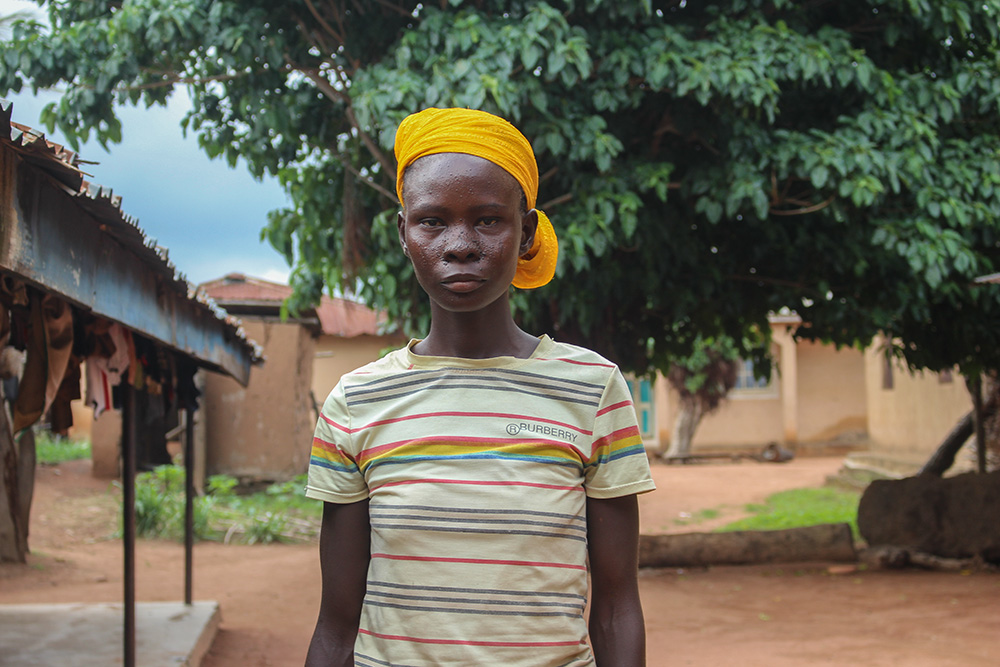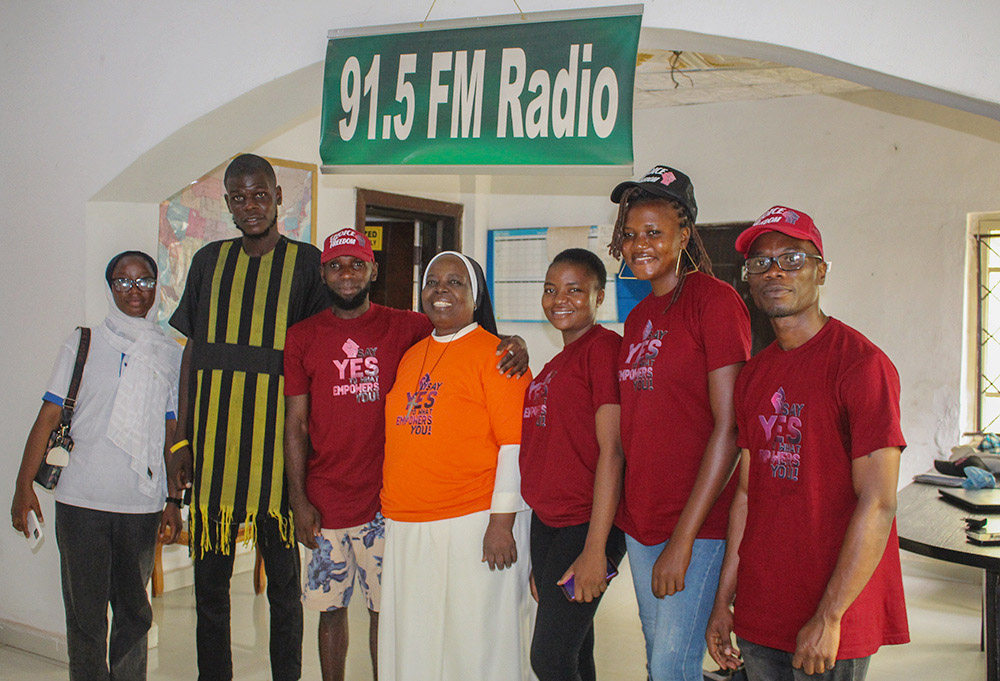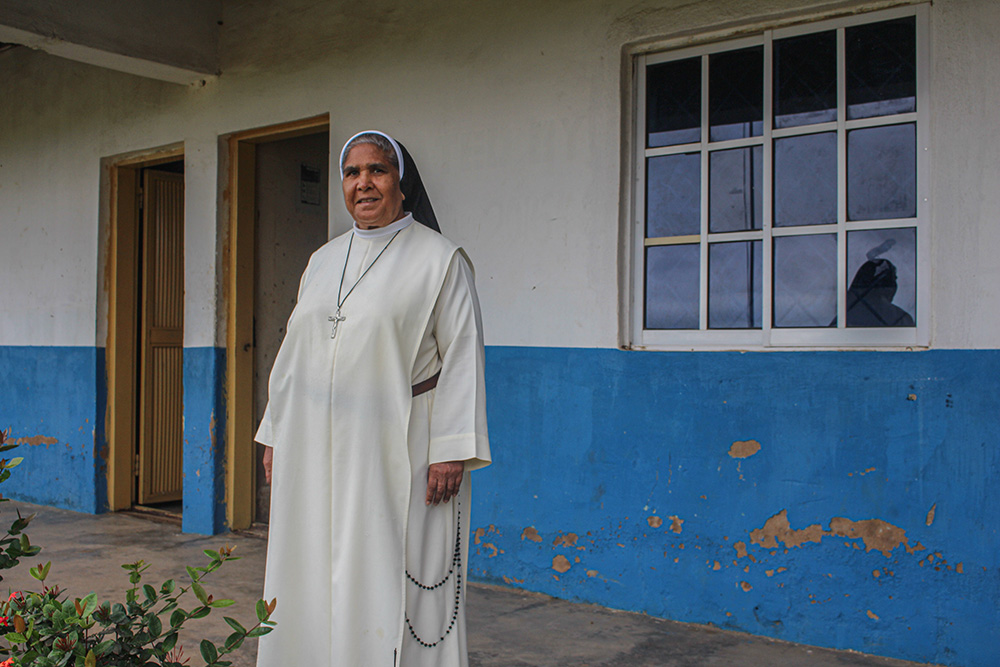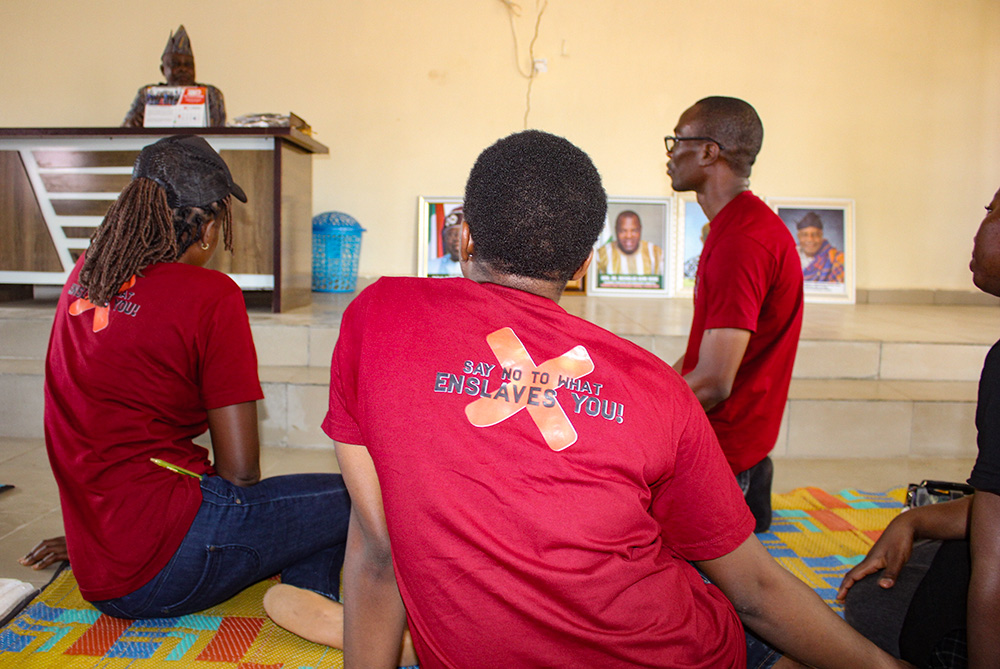
Naanzem Bayawaa, now 20, in front of her parent’s house. She gave birth to her first child at 12 and her second at 15. (GSR photo/Valentine Benjamin)
In June 2016, a pregnant Naanzem Bayawaa was married off to a man who she says was almost twice her age. It was a hastily contrived marriage by her maternal aunt, with whom Bayawaa lived in a farm settlement in Dooshima, Taraba, a state in Nigeria located about 200 kilometers away from Plateau State in the northern region of the country. She was just 15 then.
It was her second time coming home with an unwanted pregnancy. Her first unwanted pregnancy happened at the age of 12. But her aunt disapproved of her staying married to the man responsible.
Bayawaa's arranged marriage, however, lasted only one month and two days.
"My aunt desperately wanted me out because of the economic burden, but didn't consider how it would affect my life. I didn't even have the opportunity to go to school like some girls in Shendam."
She struggled with postpartum depression after having her baby, which left her with regrets and feelings of sadness and anxiety. "I left the marriage feeling completely shattered because I later found out that he had a wife and three children. It's an experience I don't wish for anyone," Bayawaa told Global Sisters Report.
More than 24 million girls in Nigeria end up in child marriages, with four out of every 10 girls getting married before they turn 18. The practice is widespread in the country, particularly in some northern states, where it is supported by interpretations of Islam that allow for a child's wedding as early as puberty.
Advertisement
Sr. Bernadette Duru of the Dominican Sisters of St. Catherine of Siena in Nigeria's Shendam Diocese is championing a campaign against child marriage. She said Bayawaa's experience is widespread across Nigeria's northern region, contributing to the vast amount of Almajiris, migrant children sent from home to study Islamist teachings.
"Teenage pregnancy and early marriage are heartbreaking reminders of the cultural nuances that have kept many girls out of school and in the hands of men most times thrice their age, and mostly occasioned by poverty and ignorance."
Duru runs the Divine Mercy Catholic Hospital, owned by Bishop Philip Davou Dung of the Shendam Diocese, where many of the girls and residents of Shendam access health care services.
Duru is not working alone; she collaborates with four other Dominican sisters — Sr. Margaret Hussein, who manages Immaculate Heart College, where many girls receive an education; Sr. Gloria Okoye, who oversees the Immaculate Heart Nursery and Primary School; Sr. Chidinma Anumudu, a lab scientist working at the hospital; and Sr. Juliana Okafor, a theologian who takes part in awareness campaigns.
Patience Yilmiap, one of the volunteers working with the nuns, told GSR that child marriage and teenage pregnancy in Plateau State are prevalent among the poorest rural households and the Hausa ethnic group.

Dominican Sr. Bernadette Duru with her team of volunteers after a live radio show, where they educated the public about early pregnancy and child marriage and responded to questions from the audience. Duru has been championing a campaign against early pregnancy and child marriage in Shendam, Plateau State, in the north-central region of Nigeria. (GSR photo/Valentine Benjamin)
Bayawaa said she eventually returned to her family with her two children but was unable to care for them, as she still hasn't received an education. Her children have not been able to enroll in any form of formal education either.
She explained that enrolling them in school has been a challenge because she doesn't have a job, and the little money she receives from their fathers is insufficient to cover the costs.
Hussein told GSR that the number of girls attending school was decreasing and she suspected that menstruation might be the cause. After some investigation, she discovered that many girls were getting married at a young age.
"Additionally, some of these girls lack an interest in education. It's a cultural issue, and they attend school mainly to obtain a certificate rather than for a genuine interest in learning."
In addition to formal education, Hussein leads the morning assembly in saying the rosary and teaches catechism. Many children have also received the sacraments of Communion and confirmation.
"Every Friday, we watch films about Christian saints. Each day, we read the Gospel, and I explain in simple terms what Jesus wants from us and what he is teaching us, focusing on the Dominican saints. We recently celebrated the feast day of St. Catherine of Siena, and we commemorate the same feasts as the church. Additionally, we hold Mass."
The teachers also dedicate time to educating students about sexual purity and abstinence.

Dominican Sr. Margaret Hussein, the school administrator of Immaculate Heart College, where many girls receive an education, poses for a photo in front of the school in Shendam, Nigeria. (GSR photo/Valentine Benjamin)
The sisters are constructing a 180-bed dormitory for girls who travel long distances to school daily. Hussein explained that the building "would cost us a minimum of 34 million naira [about US$22,000], and due to rising inflation and the increasing cost of living in Nigeria, this amount could soar to 70 million naira [about US$45,000]."
"Once the dormitory is complete, the plan is to start the construction of a boys' hostel, but we are faced with financial constraints to continue the project."
Nigeria's federal Child Rights Act, adopted in 2003, banned child marriage, among other provisions supporting children's rights. So far, 34 out of the country's 36 states have formally ratified the law. In 2023, Plateau State, where the Dominican sisters work, joined most Nigerian states in supporting children's rights.
Duru says girls married off before the age of 18 could reach their potential if allowed to reach the age of maturity and allowed to choose who to marry. "This is why our campaign slogan, 'Say yes to what empowers you, say no to what enslaves you,' is crucial."
During a campaign workshop in June, Duru's team visited several government-owned schools and discussed the risks of early marriage and dropping out of school. She said that many girls became emotional and started crying. "We showed them PowerPoint images of young girls married off as child brides and the impact it has on their lives."
Duru explained that they chose the slogan to avoid offending locals and to gain support from traditional leaders, particularly in local communities.
"Considering the patriarchal nature of Nigerian society, particularly in the north, we promptly communicated with local chiefs to inform them of our intention to campaign against early child marriage."

A team of volunteers working with the Dominican Sisters of St. Catherine of Siena visit the palace of the traditional leader of Shendam, Nigeria, in July to discuss teenage pregnancy and child marriage in the community. (GSR photo/Valentine Benjamin)
To secure their approval, Duru and her team crafted letters carefully, avoiding language that could trigger discomfort or opposition to the cause. This approach has resulted in many local chiefs consenting to and supporting the campaign.
Since January, her team has successfully brought awareness and sensitization campaigns to seven schools across six communities in Shendam.
Duru also takes the campaign on-air at a local radio station, where she and her team of volunteers discuss issues related to teenage pregnancy and child marriage and take questions from the audience.
One of the volunteers, Aminah Ibrahim, said that many young brides suffer from postpartum depression, leading them to resort to drug abuse as a coping mechanism.
The campaign against teenage pregnancy and child marriage has reached many towns and remote communities throughout Plateau State, especially in Shendam. However, Duru said her work is limited by a lack of funding.
"Not having vehicles to crisscross rural areas, especially hilly terrains, makes things more difficult. We also need equipment for diagnosis and ambulances to attend emergency cases."
In the next five years, she wants traditional leaders and the government to develop and implement policies, action plans and laws to address child marriage in rural communities.
"Our young girls need to reach 25 and not 18 before they think of getting married. So, it has been helpful meeting [with] these local chiefs, and so many of them have agreed that we should repeat our visits," Duru said.





